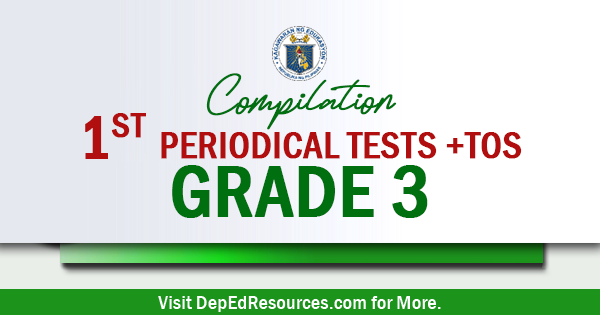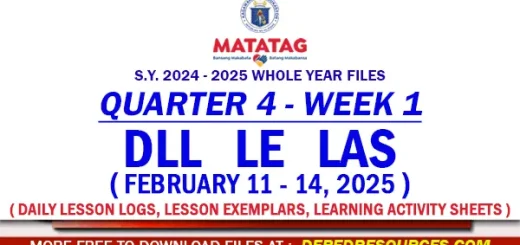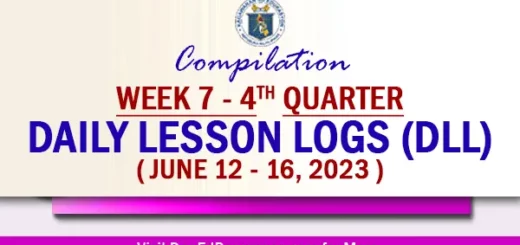GRADE 3 – 1st Periodical Tests – All Subjects with TOS
Good day teachers! We hope these help in the upcoming periodical tests! We are constantly uploading GRADE 3 – 1st Periodical Tests – All Subjects with TOS. You will find the Google download links below.
Student Evaluation and Standard-based Systems
Governments establish standards for student achievement in standards-based systems, outlining the information and skills that students are expected to have mastered at various stages of their education. The standards-based objectives are covered in the curriculum, and student evaluation emphasize meeting the requirements. The alignment of these crucial components forms the basis of standards-based systems. The results are of limited use in determining how well children are learning and in identifying any needs of the school or the students if the assessments do not closely match the curriculum and the standards.
As a result, sound approaches to evaluating performance against standards need to receive significant attention from policy. Creating large-scale standardized tests with high levels of reliability, validity, and usability may be a component of the strategy. Validity is the degree to which assessments and evaluations measure what they are intended to measure (i.e. how policy makers, school leaders and teachers make sense of and respond to assessment and evaluation results). Increasing instructor proficiency in evaluating student work against standards, providing clear instructions for marking exams, and strengthening the systems for teacher-school moderation are other feasible strategies.
Integration entails improving the link between formative and summative evaluations. Countries might, for instance, enhance the involvement of teachers in assessment. The validity and reliability of summative assessments are aided by teachers’ evaluations because they may track students’ development over time and in a variety of contexts as they work toward the complete range of objectives outlined in standards and curriculum. Countries may also think about creating “complex exams” that combine standardized examinations with performance-based assessments.
While standardized tests boost the dependability of the results, performance-based assessments are better equipped to capture complex student performances, such as reasoning and problem-solving abilities. Strengthening the ability of standardized assessments to be used as instructional tools in the classroom could be another priority. In general, it should be acknowledged that the lines between the two types of evaluation are frequently blurred in the classroom and depend on each teacher’s pedagogical style. The creation of test banks, which let teachers select among centralized created examinations, is an additional tactic. For teachers to be able to use the data in a formative manner, these assessments may include more detail and be sent more quickly. A closer integration of formative assessment can also be accomplished by making sure that teacher evaluation and school evaluation both evaluate the instructors’ and schools’ methods for formative assessment.

GRADE 3 – 1st Periodical Tests with TOS
- GRADE 3 1st Periodical Test in ENGLISH
- GRADE 3 1st Periodical Test in FILIPINO
- GRADE 3 1st Periodical Test in MTB
- GRADE 3 1st Periodical Test in SCIENCE
- GRADE 3 1st Periodical Test in ARALING PANLIPUNAN
- GRADE 3 1st Periodical Test in ESP
- GRADE 3 1st Periodical Test in MAPEH
- GRADE 3 1st Periodical Test in MATH
ADDITIONAL VERSIONS
- GRADE 3 1st Periodical Test in ARALING PANLIPUNAN Sinugbuanong-Binisaya
- GRADE 3 1st Periodical Test in ARALING PANLIPUNAN Version 2
- GRADE 3 1st Periodical Test in ARALING PANLIPUNAN Version 3
- GRADE 3 1st Periodical Test in ENGLISH Version 2
- GRADE 3 1st Periodical Test in ENGLISH Version 3
- GRADE 3 1st Periodical Test in ESP Version 2
- GRADE 3 1st Periodical Test in FILIPINO Version 2
- GRADE 3 1st Periodical Test in MAPEH Version 2
- GRADE 3 1st Periodical Test in MATH Version 2
- GRADE 3 1st Periodical Test in MATH Version 3
- GRADE 3 1st Periodical Test in MTB Version 2
- GRADE 3 1st Periodical Test in SCIENCE Version 2
MORE TEACHERS FILES HERE
Please visit our website from time to time for new and unannounced additional uploads. Thank you.
You may also request for specific files in our Facebook Page.
Don’t forget to LIKE our Page!
Please LIKE and SHARE so everyone would benefit from these files. Thank you!
LIKE US on Facebook! Click Here.
“I cannot do all the good that the world needs. But the world needs all the good that I can do.”
―
 Learn about the information we collect and how it's used.
Learn about the information we collect and how it's used. Discover how we protect your data.
Discover how we protect your data. Understand your rights and choices regarding your personal information.
Understand your rights and choices regarding your personal information.















Thank You ,Credit to the developer,great help po sa mga teachers.
It’s nice to be here.